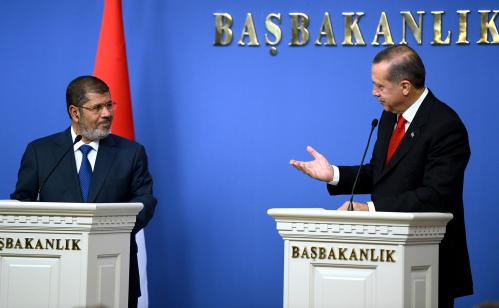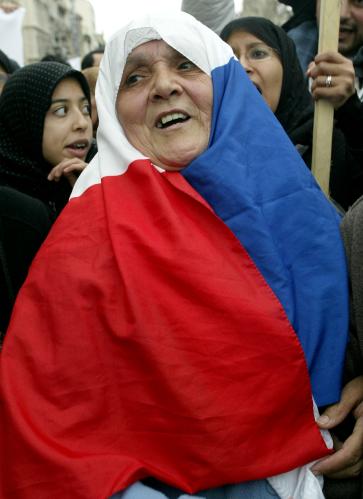

6:00 pm +04 - 7:30 pm +04
Past Event
Content from the Brookings Doha Center is now archived. In September 2021, after 14 years of impactful partnership, Brookings and the Brookings Doha Center announced that they were ending their affiliation. The Brookings Doha Center is now the Middle East Council on Global Affairs, a separate public policy institution based in Qatar.
On February 28, 2013, the Brookings Doha Center (BDC) hosted a policy discussion focused on the relationship between Islam and the state in the Arab world and the idea of a “Turkish model” for reconciling Islam and secularism. At the event, Ahmet Kuru, a visiting fellow at the BDC, presented his recently published policy briefing, “Muslim politics without an ‘Islamic state’: Can Turkey’s Justice and Development Party be a model for Arab Islamists?” In discussion with Kuru was H. A. Hellyer, a nonresident fellow with the Project on U.S. Relations with the Islamic World at the Brookings Institution. The event was moderated by BDC Director of Research Shadi Hamid and attended by members of Qatar’s diplomatic, academic, business and media communities.
Ahmet Kuru began his presentation by establishing a distinction between what he called “assertive secularism” – as practiced in France or during Turkey’s Kemalist past – and the “passive secularism” embraced by the Justice and Development Party (AKP) today. While the former actively seeks to exclude religion from the public sphere, the latter encourages the accommodation of the public visibility of religion. Kuru argued that an “AKP model” – characterized by both the party’s move from Islamism to passive secularism and a shift of state institutions from assertive to passive secularism – provides important and practicable lessons for Arab Islamists today.
This model, he stressed, should not be seen as a perfect blueprint to be imposed from above. Certain aspects of the “model” may appeal to Arab parties more than others, and the exchange of the ideas associated with it may occur in an organic manner through a variety of channels. Kuru added that the AKP model itself is not without its own deficiencies; Arab Islamists should seek to learn from its failures as much as its successes.
At the moment, Kuru said, the Arab world finds itself in a middle ground between the passive secularism of Turkey and the “semi-theocratic semi-republican model of Iran.” While Tunisia looks set to maintain a constitution that refers neither to sharia or secularism, Egypt has taken a step in the Iranian direction by granting al-Azhar a constitutional role in the interpretation of Islamic law. By moving toward Turkey’s model, Kuru argued, Arab states would “allow diverse understandings of sharia to apply in a bottom-up, rather than top-down fashion.”
The second pillar of the “AKP model” refers to its ability to conduct “Muslim politics” – the pursuit policies that reflect Islamic values – without seeking the establishment of an Islamic state. Many Islamic actors in Turkey, Kuru said, see that an “Islamic” state is actually a hindrance to the application of Muslim values. Often, these states’ perceived religious legitimacy makes them less accountable to their people. Furthermore, these critics assert, “Islamic” states often focus on formalistic aspects of Islamic law rather than genuinely promoting the substance of Islamic ethics.
Finally, the AKP’s pragmatism – for instance in its gradualist approach to effecting change or its ability to balance conflicting foreign policy agendas – offer further important lessons for Arab Islamists. Spefically, Kuru asserted, ruling Islamists in Arab countries will find this sort of flexibility useful in their efforts to establish working relationships with Western governments on which they rely for economic and other forms of support.
To be sure, the AKP’s transformation came about as a result of certain constraints and incentives – from the military, Turkish society, and the West – that may not exist in the same way in Arab cases. Still, Kuru argued, other institutional or societal influences may well encourage the embrace of passive secularism in the Arab world. These could include the enduring influence of anti-Islamist security establishments or the presence of indigenous Christian populations in countries such as Egypt.
Hisham Hellyer began by stressing that the appeal of the Turkish model in the Arab world had a lot to with the idea of autonomy, which had also been at the core of uprisings in countries such as Egypt. In that regard, Turkey’s homegrown success in building its own economy – more than the AKP’s approach to religion – was what had initially attracted Arab Islamists, he said. It should not come as surprising, therefore, if Arabs focused on building their own futures reject the idea of an external model being imposed.
In the Arab world today, no “post-uprising ideological formation” has yet solidified, Hellyer said. The model that may emerge, he argued, may well share much with the centrist, “moderate secularism” embraced by the AKP and will “probably owe very little to the Muslim Brotherhood’s approach to the Salafi political vision.” Hellyer posited that Libya and Syria – where pious Muslim leaders outside the realm of Islamism hold significant influence – may well be the first to develop this model.
Hellyer agreed with Kuru on the advantages of state-sponsored moderate secularism in countries where there is deep religious belief. While Kuru saw a state role in defining religious law as a blow to democracy, however, Hellyer suggested that it could perhaps be beneficial. He argued that in the contemporary Muslim world, there is a “crisis of religious authority” fueled in part by a proliferation of preachers (for instance in Tunisia and Egypt) who “feel they have the right to issue fatwas and expect people to act upon them.” The establishment of a “quality assurance mechanism” in the form of a role for institutions such as al-Azhar may not be negative development, as long as that role remains consultative rather than coercive.
Hellyer joined Kuru in warning against the idea of an “Islamic state.” He sought to deconstruct the term, saying that in adopting the goal of an “Islamic state,” Islamist movements often failed to acknowledge that the state itself is a modern construct. The idea of a pre-modern “Islamic state” that must be revived, Hellyer insisted, is something of a fallacy, and one that is largely ignored by today’s Islamists. He further questioned Islamists’ claim to a monopoly on interpretations of Islam. Islamism is not simply “political Islam,” he asserted, but is rather the marriage of a “certain reformist approach to Islam” with politics. He pointed out that religious institutions in many Muslim countries “contest the right of Islamist political movements to independently articulate religion.” Hellyer questioned whether Arab Islamists would be able or likely to adopt an AKP model, given the important differences that exist “not only in their political histories, but in their religious approaches.”
Following their presentations, Shadi Hamid questioned both panelists on the applicability of an AKP model in Arab societies that, unlike Turkey, often show strong support for the application of sharia. Perhaps countries such as Egypt – where according to a 2010 Pew poll, as many as 82 percent support the stoning of adulterers and 77 percent favor cutting off the hands of thieves – may actually want to establish Islamic states?
Kuru responded by arguing that the situation in Egypt and Tunisia over the last four months had shown that Islamists’ strategy of appealing solely to their base would backfire. The degree of instability in Egypt had shown that a “more balanced discourse is clearly needed.” Furthermore, he contended, by encouraging more diverse interpretations of sharia, the Muslim Brotherhood would succeed in distinguishing itself positively from its Salafi rivals.
Hellyer argued, meanwhile, that in reading these sorts of polls, there is a need to distinguish between religiosity and religious literacy. While Egypt regularly ranks as the “most religious country in the world,” he said, religious literacy there is “incredibly low.” Where questions pertain to religious identity, Egyptians will largely respond in an emphatic manner. This is not to say, however that they see religion as a political priority. “Inflation, unemployment, and the lack of security” were consistently cited as the top priorities of supporters of all major political parties, he said, while Islamic law “didn’t feature.”
Related Content

Ahmet T. Kuru
February 21, 2013

John J. DiIulio, Jr.
April 15, 2024
2023
The Brookings Institution, Washington DC
10:00 am - 11:30 am EDT

Shadi Hamid
September 29, 2023